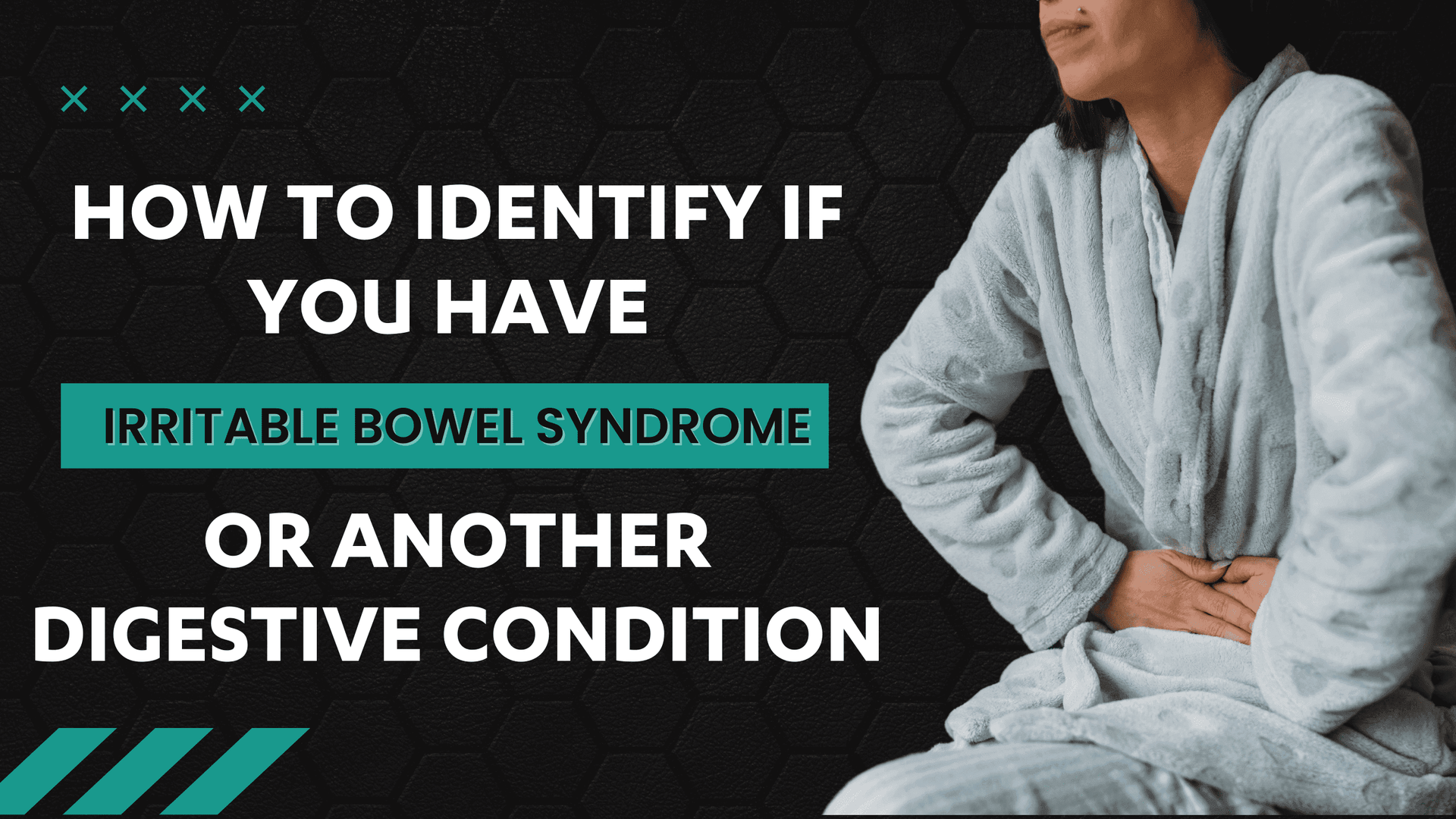
How to identify if you have Irritable Bowel Syndrome or whether it may be another digestive condition
Oh crap, like literally, do you think you might have Irritable Bowel Syndrome (IBS)? Well, you've come to the right place. I'm here to give you the lowdown on the top 10 ways to identify if you're dealing with this crappy condition. So, sit back, grab a cup of tea, and see whether you tick the box on any of these symptoms:

1. You're experiencing stomach pain and cramps that just won't quit.
Listen, we all get tummy aches from time to time, but if you're experiencing persistent pain and cramping, it could be a sign of IBS. These sensations can range from mild discomfort to full-blown, gut-wrenching agony. If your belly is hurting more often than not, it's time to take notice.
2. Your bathroom habits are all over the place.
Do you find yourself running to the bathroom more than usual? Or maybe you're feeling constipated and unable to go at all? IBS can cause a whole host of bathroom-related issues, from diarrhoea to constipation to a combination of the two. Keep an eye on your bathroom habits and note any changes that occur.

3. You're feeling bloated and gassy.
Let's face it, nobody likes feeling bloated and gassy. But if you have enough wind to keep the Aussie flag flying throughout the whole of the National Anthem, it could definitely be a sign of IBS. Bloating and gas can be caused by a variety of things, but if you're experiencing these symptoms alongside other IBS-related symptoms, it's worth investigating further.
4. Your bowel movements are different to what they used to be.
Do you remember when you used to have regular, consistent bowel movements? Yeah, those were the days. If you've noticed a change in your bowel movements, such as the frequency, consistency, or color, it could also be a sign of IBS. Keep track of any changes and report them to your doctor.

5. You're feeling fatigued and run down.
Dealing with IBS can take a toll on your body and your mental health. The very nature of this condition suggests that your body is struggling to effectively digest your food and extract the nutrition that your body requires. If you're feeling more fatigued and run down than usual, it could be a sign that your body is struggling with IBS. Don't ignore these symptoms, because this can be an early sign of nutritional deficiency that can lead to other issues within your body.
6. You're experiencing anxiety and/or depression.
IBS can be a real bummer, and it's not uncommon for people with the condition to experience anxiety and/or depression. Some people with IBS find it next to impossible to leave the house, as they don’t know when a bout of urgent, explosive diarrhoea might hit without warning. If you're feeling more anxious or down than usual, it's important to speak to your doctor or a mental health professional about how you're feeling.

7. Certain foods trigger your symptoms.
Do you notice that certain foods seem to trigger your IBS symptoms? Maybe it's spicy food, or maybe it's dairy products. Whatever it is, keeping a food diary and tracking your symptoms can help you identify any trigger foods, giving you the option to avoid them to prevent unnecessary bouts of bloating, pain and explosive diarrhoea.
8. You're experiencing nausea or vomiting.
Nausea and vomiting aren't the most glamorous of symptoms, but they're often a sign that something isn't quite right with your digestive system. If you're experiencing symptoms at the top end and bottom end of your digestive system, it can make for a very miserable existence. If you have this alongside other IBS-related symptoms, it's worth speaking to your doctor about them.

9. Your symptoms tend to flare up during times of stress.
Stress can wreak havoc on your body, and it's no different when it comes to IBS. If you notice that your symptoms tend to flare up during times of stress, it's worth exploring stress-management techniques to help keep your symptoms in check. Perhaps a relaxing healing meditation on your acupressure mat is calling your name?
10. Feeling of incomplete bowel movement
Some people with IBS may feel like they haven't fully emptied their bowels after using the restroom, even if they've had a bowel movement. This can lead to discomfort and the urge to use the restroom again. It's important to note that this symptom can also be caused by other conditions, so it's important to speak to your doctor to get an accurate diagnosis.

IBS is a tricky condition to diagnose, and it's important to rule out other potential causes of your symptoms before jumping to conclusions, because it could be a case of mistaken identity. Here are a few other conditions that could be masquerading as IBS:
- Inflammatory bowel disease (IBD): While IBS and IBD might sound like a match made in bowel heaven, they're actually quite different. IBD is a chronic inflammatory condition that affects the digestive tract and can cause severe symptoms like bloody stools, fever, and unintentional weight loss. So, if you're experiencing symptoms that are more severe and persistent than your average tummy troubles, it's worth checking out.
- Celiac disease: Don't go blaming every bagel and croissant for your IBS symptoms just yet. Celiac disease is an autoimmune disorder in which the body cannot tolerate gluten, a protein found in wheat, barley, and rye. Symptoms of celiac disease can include abdominal pain, diarrhoea, and bloating, so can be mistaken for IBS. But if you suspect gluten may be the culprit, it's worth getting tested for celiac disease.
- Diverticulitis: Diverticulitis is a condition in which small pouches called diverticula form in the colon and become inflamed or infected. This can cause symptoms like abdominal pain, fever, and nausea, which can mimic those of IBS. But don't be fooled - diverticulitis requires different treatment than IBS, so it's important to get an accurate diagnosis.
- Endometriosis: Ladies, listen up. Endometriosis is a condition in which the tissue that normally lines the uterus grows in places it shouldn’t, causing a lot of pain and inflammation. Believe it or not, endometriosis can also cause digestive symptoms like bloating, constipation, and diarrhoea, which can, once again, be mistaken for IBS. If you're experiencing these symptoms alongside pelvic pain or menstrual irregularities, it's worth discussing endometriosis with your doctor. For more information on natural suggestions to help with endometriosis click here.
- Colon cancer: Okay, this one is serious business. Colon cancer can cause symptoms like abdominal pain, constipation, and changes in bowel habits, which can be similar to those of IBS. But don't let IBS distract you from the possibility of something more serious. If you're over 50 or have a family history of colon cancer, it's important to get screened regularly.
If you're experiencing any of the symptoms listed above, it's important to speak to your doctor about them. They can help determine whether IBS is the cause or if there may be another underlying condition that needs to be addressed. Your doctor may recommend tests, such as blood tests or a colonoscopy, to rule out other potential causes. They may also ask you questions about your medical history, lifestyle, and diet to get a better understanding of your symptoms.

If you do receive a diagnosis of IBS, don't despair. While it's a chronic condition, there are ways to manage your symptoms and improve your quality of life. Your doctor may recommend dietary changes, stress-management techniques, or medication to help alleviate your symptoms. To find out some natural tips to help relieve IBS symptoms, read out blog here.
If you know a friend or family member that is having trouble with their number two’s please send them the link to this blog. Knowledge is empowering and can be the difference between diagnosing one of these conditions early and implementing strategies, versus living a reclusive life too afraid to venture far from the toilet and never leaving home.






